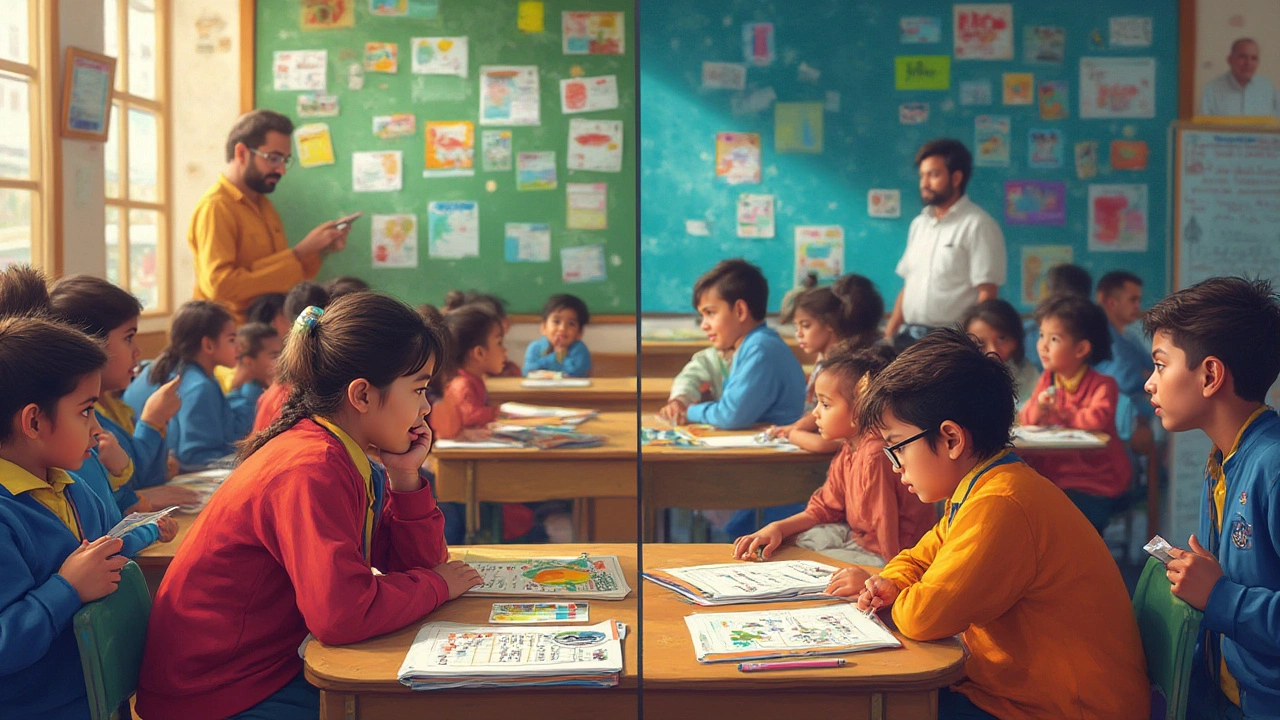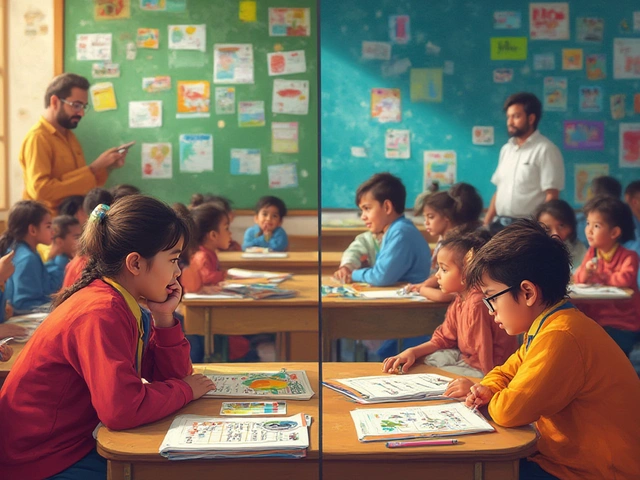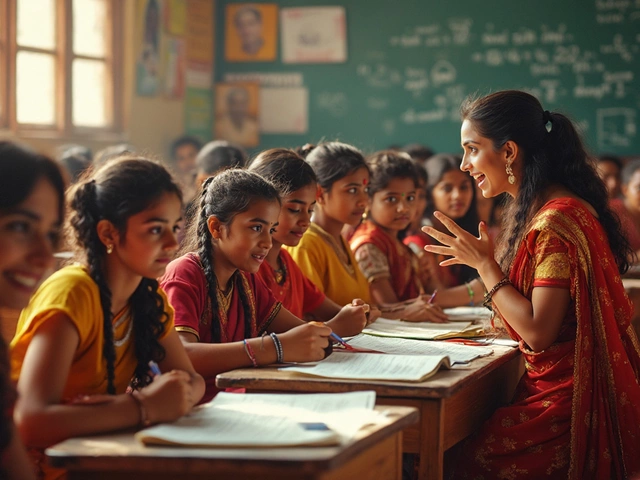If you’re a parent making a big decision about your child’s education, you’re probably staring at the two giants: CBSE and the British curriculum. But the battle isn’t just about syllabuses or exam patterns; it’s about what your child will really get out of years in that classroom. Some parents swear by the solid foundation CBSE brings, but others can’t stop talking about the skills-driven British approach. Both have their unique flavor—and it’s not always obvious which one will fit your family’s needs best. So, which one gives kids the edge?
What Sets CBSE and British Curriculum Apart?
Let’s start with the basics. The Central Board of Secondary Education, better known as CBSE, is India’s most popular school board. It sets a clear path from Class 1 all the way to Class 12, and kids everywhere—from Delhi to Dubai—follow this pattern. Every year, over 20,000 CBSE schools keep things uniform and standard. Standardization is CBSE’s strength: if your job demands you move between Indian cities, or even internationally, your child can hop from school to school without a hiccup in their studies. CBSE’s curriculum is deeply aligned to entrance exams for engineering and medical colleges like JEE and NEET, which is why so many parents bet on it.
The British curriculum, often called the National Curriculum for England, takes a different route. It’s international at its core, with a structure that leads up to IGCSEs, AS, and A Levels. The whole system is built around skills—critical thinking, creativity, and analysis. Instead of memorizing, students are encouraged to question, discuss, and problem-solve. Every year, millions of kids globally, from the UK to Kenya to Mumbai, follow this pattern. British schools are famous for project-based activities and coursework that counts for much more than just rote learning. This means if your family might move to the UK, Australia, or even Southeast Asia, the British curriculum will help smoothen that transition for your child.
One quirky difference? British curriculum report cards look less like a mark sheet and more like a progress tracker, covering not just exams but attitude, effort, and even involvement in class. CBSE, on the other hand, still puts a lot of weight on exams, although there have been some tweaks to test a student’s application of knowledge. This core distinction—exam heavy vs skills heavy—shapes the school routine, homework, and even student stress in both systems.
The real impact? CBSE students often get drilled in exam patterns and learn to manage time under pressure. British curriculum kids usually walk out more confident in presentations, public speaking, and collaborative work. That flexibility is a big reason why graduates from British schools are sought after in universities around the world, including top Indian colleges.
How Learning and Assessment Work Differently
Take a peek into a CBSE classroom, and more often than not, you’ll see a teacher leading the class, chalk in hand, and students scribbling notes at record speed. Lessons revolve around textbooks prescribed by NCERT—a government organization in India. The stress is on clear, concise content with lots of exercises for exam practice. While the syllabus is organized and you know what’s coming every year, there’s less emphasis on interdisciplinary projects or exploring beyond the textbook. It’s laser-focused, especially after Class 10, as kids prep for career-defining board exams in Class 12.
That doesn’t mean CBSE is all about memorization. In 2024, reforms nudged schools to include more competency-based questions and activities, especially up to Class 8. But by the time a student hits the big league Class 10 or 12 board exams, practice papers, sample questions, and revision guides rule the roost. It’s all about maximizing those marks, and many students get really good at cracking exams under stress.
Now flip over to a British curriculum school. Picture open-ended discussions, presentations, debate clubs, even drama as part of regular lessons. Subjects aren’t siloed; you might find history mixing with literature, or math joining forces with science for a group project. British curriculum schools rely on their own range of textbooks, but teaching is more fluid. Assessment isn’t always a big one-shot exam; instead, students build a portfolio of their work over two years leading up to their IGCSEs (around age 16), with coursework counting for anywhere from 20% to 50% of some grades. Some exams are open book, especially at the A Levels.
British system students don’t just chase marks. Universities, especially the world’s best ones, love the depth A Levels bring—a student can specialize as early as 16. That said, some parents worry if the flexibility leads to missed basics. CBSE’s tightly mapped math syllabus is notorious for making sure nobody skips foundational algebra or geometry, but the British curriculum lets students drop certain subjects pretty early if they decide to specialize.
If you’re thinking about university, this is a big difference. Indian colleges, even now, often lean toward CBSE marks and exam patterns when shortlisting applicants. If your eye is on the Ivy League, Oxbridge, or universities across Asia or Australia, British curriculum transcripts are usually more easily understood and accepted. Still, both boards have figured out how to standardize grades for cross-country admissions—don’t worry, nobody needs to feel boxed in.

Which Curriculum Helps Kids Succeed: Skills, Stress, and Students
Here’s the million-rupee question: does one system actually make kids better “prepared for life” than the other? Even teachers can’t always agree.
CBSE fans point to high performance in competitive exams. India’s brightest engineers and doctors almost always went to CBSE schools. The logic is clear—if your child dreams of AIIMS, IITs, or the Indian Administrative Service, the CBSE path is the straightest. The system trains kids to churn out answers under pressure, juggle huge syllabuses, and manage their time to the minute. In real life, these are priceless skills. Alumni of top CBSE schools often say their time-management game is strong—helpful for any demanding college or job later on.
But mental health is a rising concern with the high-pressure environment in many CBSE schools. The push for exam results starts young, and some students burn out by the time they reach college. There’s been a slow but steady shift: as of 2025, CBSE schools are encouraged to add creative hobbies, life skills training, and a handful of wellness sessions. But for students who crave a more exploratory, relaxed, and varied classroom, the British curriculum is a breath of fresh air.
British curriculum students are known for strong communication, research, and teamwork skills. Presentations, research projects, and extra-curriculars aren’t afterthoughts—they’re part of the grading system. By the time A Levels roll around, most British curriculum grads are used to crafting essays, tackling tough questions no textbook answers, even pitching ideas to a group. It’s no surprise so many become great writers, scientists, or leaders. Internationally, this flexibility has been studied and linked to better adaptability at university: a 2023 survey by Cambridge Assessment found A Level students did better at adjusting to student life in the UK and US, compared to their CBSE equivalents.
Some parents worry British curriculum’s flexibility can leave gaps. What if a student drops math early, but later needs it? Unlike CBSE, where maths is nearly compulsory until Class 12, British curriculum schools let kids choose subjects by age 14. That’s freedom, but also a risk if a child hasn’t decided on a career yet. The British system banks on supportive counsellors and mentoring to help students make smart choices—so if you’re considering it, ask how the school guides subject selections.
On the flipside, life isn’t about test scores alone. Many CBSE grads, once they enter the working world, realize they need to catch up on things like speaking in meetings, creative problem-solving, or writing a killer proposal. British curriculum alumni, especially from good schools, often have a headstart there.
How to Choose: Tips for Parents and Students
Before you decide which path is best, it helps to think about lifestyle, long-term plans, and your child’s personality. Here are some tips to make the process easier:
- CBSE works best for families rooted in India or who have a clear focus on Indian universities and exams. If your career means frequent transfers within India, choosing a CBSE school gives your child a smoother, more consistent experience.
- If you see yourselves moving abroad, especially to countries like the UK, Australia, or Singapore, the British curriculum aligns better with international standards. Universities everywhere recognize IGCSE and A Level results.
- Consider your child’s style of learning. Do they thrive under structure and love mastering a big syllabus? CBSE is designed just for that. Are they creative, curious, and do better exploring a range of subjects through discussion and projects? British curriculum schools are built to unleash that.
- Universities matter. If your child wants to appear for entrance exams in India (JEE, NEET, etc.), CBSE provides the best prep. A Levels and IGCSEs, meanwhile, are prized by universities worldwide – including Ivy League and Oxbridge.
- Ask about support and counselling at the school. British curriculum schools need to guide students in subject choice, which can shape their careers. CBSE schools should be open about how they bring creativity and well-being into daily life.
- Check extracurriculars—British schools often build them into grades, while CBSE schools usually offer them as add-ons. If your child is passionate about music, drama, or art, look for how those are supported in both systems, not just tacked on.
- Don’t forget about language. CBSE schools are strong in Hindi and other Indian languages, while British schools focus mainly on English. This can make a difference if you want bilingual options.
- Look at the teachers and classroom vibe. The best school is the one your child feels excited to attend every day, regardless of board.
And here’s something important: No board is perfect. The best schools, whether CBSE or British curriculum, are always evolving. New reforms come in every year: CBSE now includes coding and financial literacy, while British schools tweak coursework to keep things real-world relevant. Talk to other parents, visit schools, and always chat with your child. Their comfort, curiosity, and confidence should drive your final choice. After all, in the real world, it’s not the board, but the person who walks out of school ready to take life head-on.



